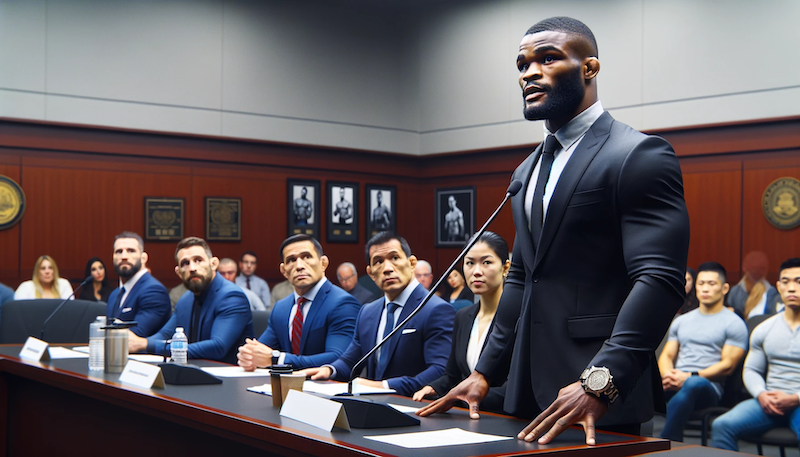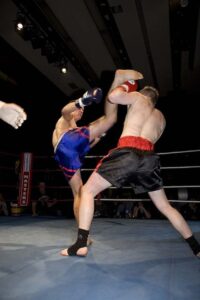
Are you wondering whether UFC fighters can appeal bad decisions and whether UFC decisions can be overturned?
In this article, we answer those questions and also look at the impact of overturned UFC decisions and 3 of the most interesting cases.
Contents
Can UFC Fighters Appeal Bad Decisions?
UFC fighters have the right to appeal decisions they believe are unjust or incorrect, but they need proof of clear rule violations, misapplication of the rules, evidence of collusion or fraud, or cases of referee errors or mistakes.
However, the appeal process is governed by the Athletic Commission overseeing the event and not the UFC. Each commission has its own rules and procedures for appeals.
To successfully appeal, fighters must present compelling evidence supporting their claim. This could include fight footage, referee and judge statements, and other relevant information.
Simply disagreeing with a judge’s decision or feeling that the decision was unfair isn’t sufficient grounds for an appeal.
The process typically involves filing a formal appeal with the Athletic Commission within a specific timeframe after the fight, often within a few days.
The commission then reviews the appeal, including a hearing where evidence such as fight footage, referee and judge statements, and other relevant information is presented.
After reviewing the case, the commission makes a decision. They may uphold the original decision or overturn it to the decision they believe is correct.
It’s crucial to note that successful appeals in combat sports are relatively rare, as commissions are generally hesitant to overturn a decision unless there’s clear and compelling evidence of a significant error or wrongdoing.
In summary, while UFC fighters can appeal bad decisions, the success of such appeals largely depends on the ability to provide concrete evidence of rule violations or other significant issues in the judging or officiating of the fight.
Can UFC Decisions Be Overturned?
Yes, UFC decisions can be overturned, though such instances aren’t common. A decision overturning typically happens under 4 specific circumstances, as regulated by the overseeing Athletic Commission.
Here are the 4 primary reasons that can lead to a UFC decision being overturned:
1. Rule Violations
The most common reason for overturning a decision is a rule violation.
In around 9/10 UFC decisions overturned, it’s due to a fighter being caught for having taken illegal substances such as steroids and/or performance-enhancing drugs.
For instance, Jon Jones’ victory over Daniel Cormier in their rematch at UFC 214 was later changed to a no-contest after Jones tested positive for the steroid Turinabol.
Other uncommon rule violations that typically lead to a UFC decision being overturned are:
- Testing positive for cannabis
- Using illegal equipment during a fight – e,g, an inhaler without a TUE
- The use of illegal strikes that were missed by the referee – however, most times these are caught immediately rather than overturned.
2. Counting Errors
While rare, counting errors by judges can lead to a decision being overturned. This happens when judges’ scores are incorrectly tallied.
The first fight between Demetrious Johnson and Ian McCall is a notable example, where a counting mistake initially declared Johnson the winner, but was later corrected to a draw.
3. Misdeclaration
If an incorrect decision is announced during or after the fight, it can lead to an overturned result or a correction.
This is incredibly rare, but it has happened. One of the best examples was at UFC 205, where Bruce Buffer announced Tyron Woodley had beaten Stephen Thompson via split decision, despite the scores being 47-47, 47-47, and 48-47.
Quickly, the UFC realized their mistake, and Bruce Buffer corrected the decision to a majority draw.
4. Referee Errors or Mistakes
UFC Decisions can also be overturned due to errors or mistakes made by the referee during the fight. Most often, it’s when a referee ends a fight early as they think the fighter is badly hurt or knocked out, but in actuality they’re fine.
An example of this is the fight between Leandro Silva and Andrew Dober at UFC Fight Night 62, where the referee mistakenly thought Dober had passed out, leading to an incorrect stoppage.
The Brazilian MMA Athletic Commission later overturned the decision to a no-contest after reviewing the case and acknowledging the referee’s error. The case was successful as the referee also acknowledged his error.
Overall, these examples illustrate that UFC decisions can be overturned under specific circumstances, primarily involving rule violations, counting errors, misdeclarations, and referee mistakes.
The integrity of the sport and the accuracy of its officiating are paramount, and the mechanisms to overturn decisions are in place to uphold these standards.
The Impact of Overturned UFC Decisions
When a UFC decision is overturned, it can have significant and far-reaching impacts on the fighters involved, their careers, and their standings within the sport.
Here are 9 key consequences:
1. Loss of Titles: If a fighter wins a title and their victory is later overturned, they will be stripped of the title. This affects their standing and alters the championship lineage in their weight class.
2. Loss of Ranking: Overturned decisions can lead to a loss of ranking when the rankings are updated the following Tuesday.
This can have long-term implications for their career, as rankings influence matchmaking and title-shot opportunities.
On the other hand, fighters who lost may have their ranking restored, especially if the fight was overturned because their opponent tested positive for banned substances.
3. Potential Release: In some cases, particularly where the overturned decision is due to a serious rule violation like doping, the fighter may face release from their UFC contract.
4. Suspensions from USADA: If the overturned decision is due to doping or another similar rule violation, the fighter will likely face a suspension from the United States Anti-Doping Agency (USADA).
The length of the suspension can vary but often results in significant time away from competition.
5. Potential Loss of UFC Bonuses: Fighters who earn performance-related bonuses (such as “Fight of the Night” or “Performance of the Night” bonuses) may have to forfeit these if their win is overturned.
These bonuses can be as much as $50,000, representing a substantial financial loss. Of course, this bonus would only be held if there was an immediate appeal by the opponent.
The commission would then hold the bonus until the review process is complete.
6. Loss of Win Bonuses: Many fighters have contracts that include win payments, which are only paid out if they win their fight. If a decision is appealed by an opponent, the win bonus may be held until the review process is complete.
If the fighter’s win is overturned, they will lose their win bonus.
7. Reputational Damage: Beyond the tangible impacts, having a decision overturned due to being caught taking steroids or PEDs can damage a fighter’s reputation. This can affect their marketability, sponsorships, and fan support.
8. Psychological Impact: The overturning of a decision can also have psychological effects on a fighter. It can lead to a loss of confidence, and motivation, and can affect their future performances.
9. Legal and Financial Ramifications: In some cases, particularly with doping violations, there may be legal consequences. Additionally, fighters may face financial burdens due to legal fees, fines, or the need to repay bonuses.
In summary, the overturning of a UFC decision isn’t just a reversal of a fight’s outcome; it can have profound and lasting effects on a fighter’s career, financial situation, reputation, and psychological well-being.
It also impacts the broader dynamics of the sport, including rankings and title holdings.
Overturned UFC Decisions (3 Interesting Cases)
1. Greg Hardy vs. Ben Sosoli (Rule Violation – Inhaler)
At UFC on ESPN 6 in October 2019, Greg Hardy’s unanimous decision victory was overturned to a no-contest by the Massachusetts State Athletic Commission (MSAC).
His victory was overturned because he used an inhaler (rule violation) during the minute break between the second and third rounds.
Greg Hardy said that the inhaler was a Ventolin albuterol inhaler for exercise-induced asthma.
Using an inhaler is a rule violation if not pre-approved by the State Athletic Commission overseeing the event. Fighters who wish to use an inhaler during a fight need to secure a Therapeutic Use Exemption (TUE).
This is because inhalers used for asthma often contain substances like beta-2 agonists, which in certain doses can have performance-enhancing effects or mask the use of prohibited substances.
2. Matt Riddle vs. Chris Clements and Che Mills (Rule Violation – Cannabis)
From July 2012 to March 2013, Matt Riddle had two victories overturned to a no-contest after testing positive for cannabis.
His win against Chris Clements at UFC 149 was overturned by the Calgary Combative Sports Commission.
His win against Che Mills at UFC on Fuel TV 7 was overturned by the UFC, as the UFC often acts as its own governing body in countries or areas where there isn’t a recognized Athletic Commission to oversee the event.
Matt Riddle was subsequently released, but it was more for his domestic abuse comments that saw him banned for life, rather than the weed.
3. Leandro Silva vs. Andrew Dober (Referee Mistake)
At UFC Fight Night 62 in March 2015, Leandro Silva’s submission victory over Andrew Dober was overturned to a no-contest by the Brazilian MMA Athletic Commission (CABMMA).
The fight was initially stopped by referee Eduardo Herdy, who mistakenly thought Dober had passed out in a guillotine choke attempt by Silva.
Initially, CABMMA officials stated they couldn’t change the decision. However, after a formal appeal from Dober and a detailed technical report from the referee admitting his mistake, the commission decided to overturn the result.
This case is significant as it demonstrates that UFC decisions can be overturned due to a referee’s error or misjudgment.
The overturning was based on the recognition that the referee’s stoppage was a self-evident error, made in good faith but ultimately incorrect.
The CABMMA’s decision to overturn the fight to a no-contest highlights the importance of fairness and integrity in the sport, ensuring that fighters are not unfairly penalized due to officiating errors.




